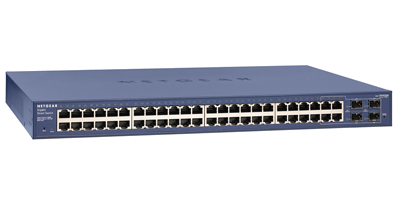We have had, in the office, a NetgearWikipedia: Netgear, Inc. (stylized as NETGEAR in all caps), is an American computer networking company based in San Jose, California, with offices in about 22 other countries.[3] It produces networking hardware... GS748T for a while now. This is a mid-range 48 port managed GigabitWikipedia: In computer networking, Gigabit Ethernet (GbE or 1 GigE) is the term applied to transmitting Ethernet frames at a rate of a gigabit per second. The most popular variant, 1000BASE-T, is defined by the ... switch which retails at between £350 and £400. We have recently exceeded the capacity of this switch and purchased a second one. We bought this second hand for about £320. The first unit that arrived blew the fuse in its plug on installation and subsequently failed to power up. We returned this for a replacement which, on installation, tripped the RCDWikipedia: A residual-current circuit breaker with integrated overcurrent protection (RCBO) combines RCD protection with additional overcurrent protection into the same device. that protected the ring main it was connected to.
There was a rattle inside the unit when it was shaken so we took the case off and discovered 2 missing plastic heat sinkWikipedia: A heat sink (also commonly spelled heatsink) is a passive heat exchanger that transfers the heat generated by an electronic or a mechanical device to a fluid medium, often air or a liquid coolant, whe... pins as well as their metal springs. One of the springs was discovered wedged between the case and the main circuit board in the switch and the other wedged firmly between the power supply and the case.
Having Googled this we found this to be a common issue with these switches. These 3 quotes show this:
“I have a netgear gs748t which had a broken heatsink mounting or two. I thought I had recovered all the broken parts when I took out the mainboard but there was still a spring under the psu which shorted when the unit was moved whilst on.”
“Over time, plastic fatigue causes spring loaded pins to pop off and heatsinks will no …”
“I opened it up and found two of the metal springs freely exposed to mainboard … More troubling is that three heatsink pins are unaccounted for and *must* have …”
If you have one of these switches, check if you’re missing any heat sink pins. If you are, their springs are undoubtedly inside the unit somewhere. You may need to remove the main circuit board or the PSU to find them.
We’ve opted to liberally apply glue gun glue to the pins such that if they do break, the springs will stay fairly self contained.
